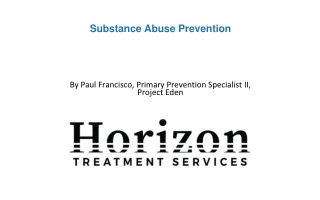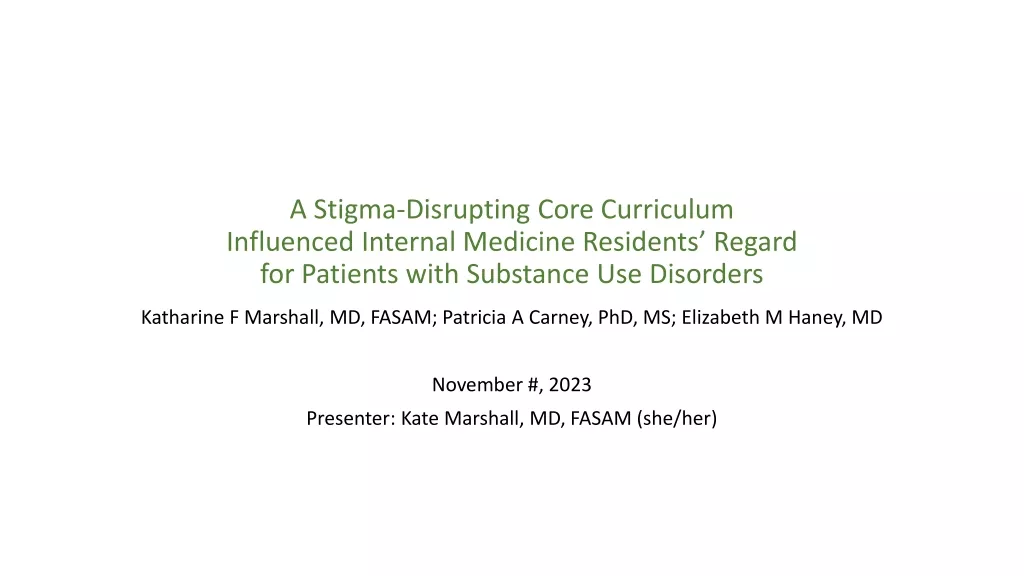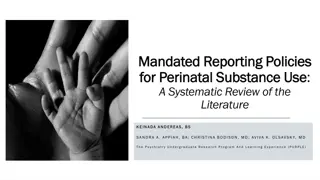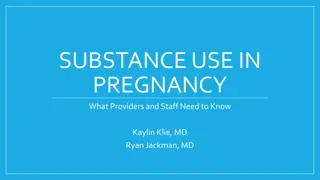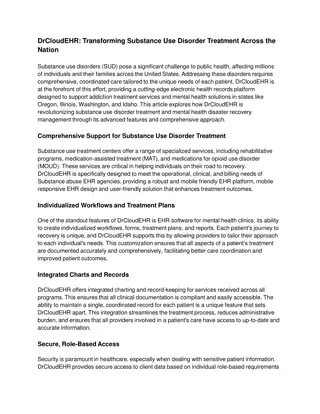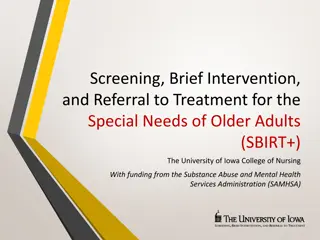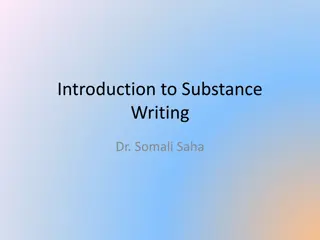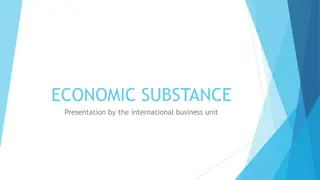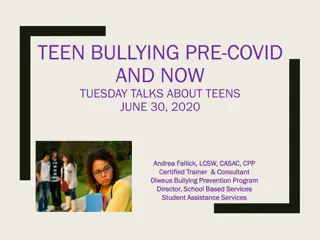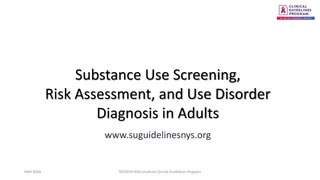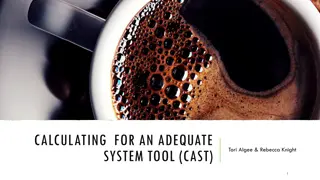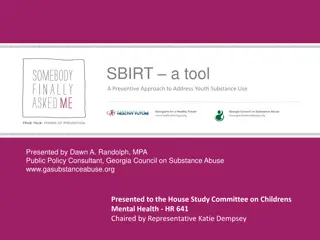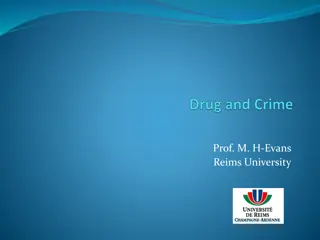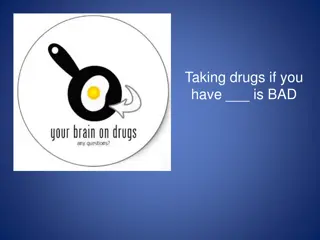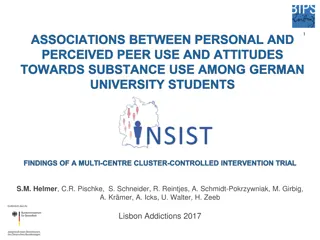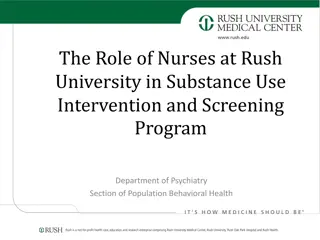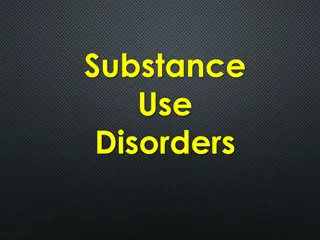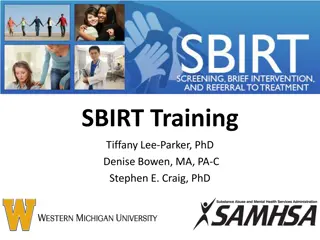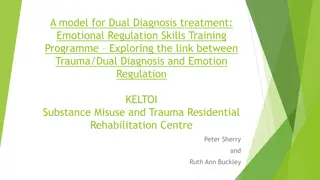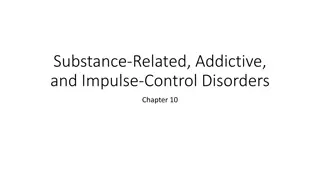Substance Abuse Prevention
Exploring substance abuse prevention strategies by Paul Francisco, a Primary Prevention Specialist. The session covers defining substance abuse, statistics of youth substance use, types of substances used, warning signs for parents, and preventative measures. Learn about the harmful effects of vapin
0 views • 42 slides
Drug-Free Workplace Training Overview
This drug-free workplace training provides essential knowledge for supervisors in identifying and responding to substance misuse among employees. It covers statistics on substance use disorders, the benefits of a drug-free workplace, relevant federal laws, warning signs of substance misuse, and the
2 views • 27 slides
Understanding Substance Abuse and Addiction Signs
Substance abuse is characterized by harmful substance use with significant impairment, while addiction is a disease where individuals cannot stop using despite harm. Signs include changes in behavior, lack of interest in previous activities, problems at work or with relationships, increased toleranc
1 views • 46 slides
Enhancing Internal Medicine Residents' Approach to Patients with Substance Use Disorders
This study focuses on developing and implementing a stigma-disrupting curriculum to improve internal medicine residents' attitudes and knowledge regarding patients with substance use disorders. By addressing provider stigma and enhancing preparedness, the aim is to promote positive regard and increa
1 views • 27 slides
Actions Emanating from the Evaluation of the Governance Reform
The evaluation of the governance reform within the WMO aimed to assess its alignment with strategic objectives, effectiveness in responding to societal needs, coordination efficiency, decision-making process, agility, and more. Evaluation criteria included relevance, design validity, effectiveness,
1 views • 13 slides
Substance Use Screening Tools in Pregnancy: SURP-P
The Substance Use Risk Profile Pregnancy (SURP-P) is a screening tool to assess substance use during pregnancy. It involves questions about marijuana smoking, alcohol consumption, and perceived need to cut down on substance use. Scoring determines low, moderate, or high risk levels. A brief assessme
4 views • 6 slides
Mandated Reporting Policies for Perinatal Substance Use: A Systematic Review of the Literature
This systematic review explores mandated reporting policies in the U.S. concerning perinatal substance use. It highlights the impact of substance use on perinatal and infant health, the disparities in reporting practices, and the need for early interventions to protect vulnerable populations.
3 views • 14 slides
Substance Use in Pregnancy: Important Considerations for Healthcare Providers
This presentation discusses the impact of substance use during pregnancy, including identifying signs of substance use disorder, trends in national and Colorado statistics, effects on maternal health and fetal development, screening recommendations, minimizing stigma, and treatment options for pregn
0 views • 35 slides
Article 26_ DrCloudEHR_ Transforming Substance Use Disorder Treatment Across the Nation
Explore effective solutions for substance abuse EHR with DrCloudEHR in Louisiana, Maryland, Pennsylvania, Washington DC. Discover personalized programs for substance abuse and mental health services administration
0 views • 3 slides
SBIRT+: Tailoring Substance Use Intervention for Older Adults
SBIRT+ is a targeted training approach focusing on Screening, Brief Intervention, and Referral to Treatment to meet the unique needs of older adults, addressing risky substance use in the elderly population. It aims to address the growing concern of alcohol use and medication misuse in Baby Boomers
0 views • 38 slides
Universal Evaluation Framework: Simplifying Evaluation Processes
This session introduces the Universal Evaluation Framework (UEF) developed for evaluating QAA Scotland Enhancement Themes. Participants learn key evaluation questions, evidence capture, and the Theory of Change to enhance evaluation confidence. The QAA Scotland Evaluation Odyssey details historical
2 views • 14 slides
Implementing Blind Evaluation Pilot in HORIZON EUROPE: Key Facts and Process
HORIZON EUROPE is conducting a pilot on Blind Evaluation in the 2023-2024 work program to address biases in the research and innovation evaluation process. The pilot aims to assess the feasibility of blind evaluations in ensuring fairness and mitigating potential biases towards well-known organizati
9 views • 9 slides
Mastering Substance Writing: Key Steps and Techniques
Dr. Somali Saha introduces essential steps for drafting substance, emphasizing comprehension, selection, elimination, crafting, and reproduction. Learn to condense effectively, avoid unnecessary details, and enhance clarity, simplicity, and brevity in writing. Dive into the art of condensation by co
0 views • 7 slides
Exploring Developmental Evaluation for Better Decision-Making
Delve into the realm of developmental evaluation, focusing on its purpose, principles, and application in practice. Understand how developmental evaluation emphasizes real-time data collection for informed decision-making in complex systems. Learn about key principles such as developmental purpose,
0 views • 25 slides
Enhancing Evaluation Capabilities in Mongolia for Agenda 2030
The Mongolian Evaluation Network in collaboration with UNDP is working to integrate the 2030 Agenda into national strategies and plans, establish institutional coordination mechanisms, align budgets, and enhance data monitoring systems. Key stakeholders including government agencies, NGOs, and inter
0 views • 9 slides
Understanding Economic Substance Presentation in International Business Units
The presentation focuses on the Economic Substance Act (ESA), outlining the scope of resident companies under ESA, relevant activities requiring annual declaration, the Economic Substance (ES) test criteria, outsourcing possibilities, and the Reduced ES test for specific holding companies in Barbado
4 views • 13 slides
Understanding Evaluation in Education
Evaluation in education is a comprehensive term that encompasses measurement, testing, and qualitative examination of student behavior. It involves both quantitative and qualitative descriptions, along with value judgments. Differentiating from mere measurement, evaluation provides a deeper analysis
0 views • 28 slides
Sustainable Evaluation Systems Workshop Summary
Workshop on Sustainable Evaluation Systems by Stephen Porter at the NEC Conference focused on defining evaluation systems, addressing their failures, and emphasizing the importance of quality, use, and networks in achieving sustainability. Participants engaged in activities such as bingo card introd
0 views • 38 slides
The Link Between Teen Bullying and Substance Use: Insights and Implications
The article discusses the link between teen bullying and substance use, emphasizing the various forms of bullying such as physical, verbal, and cyberbullying. It also explores the relationship between being bullied and engaging in alcohol and marijuana use, highlighting statistics on how bullying ca
0 views • 15 slides
Impact and Evaluation Toolkit for Churches and Christian Charities
This toolkit aims to equip churches and Christian charities engaged in small-scale social action projects to think about impact, measure impact, choose data tools, reflect on evaluation data, and use it effectively. It covers principles of evaluation, setting objectives, selecting indicators, storyt
0 views • 34 slides
Overview of Monitoring and Evaluation in the GEF
The Evaluation in the GEF and Training Module focuses on promoting accountability and learning within the Global Environment Facility (GEF) through monitoring and evaluation activities. The GEF Independent Evaluation Office plays a crucial role in assessing results, effectiveness, and performance of
0 views • 25 slides
Tracking and Measuring Outcomes in King County, WA Mental Health and Substance Abuse Services Division
King County Mental Health, Chemical Abuse, and Dependency Services Division manage publicly funded mental health, substance abuse services, and co-occurring disorders. They prioritize interventions, job readiness, homelessness prevention, and reducing emergency medical and criminal justice involveme
1 views • 24 slides
Potential Amendments for Reforming REACH Evaluation Process
Discussion at the Ad-hoc Meeting of Competent Authorities for REACH and CLP focused on potential options for amending the REACH Regulation to reform the evaluation process. Topics included registration-related measures, substance evaluation, testing proposals, compliance checks, and expectations dur
0 views • 30 slides
Developing an Evaluation Work Plan for Effective Program Assessment
This presentation by Amy D. Andrade from San Jose State University focuses on developing an Evaluation Work Plan to identify responsibilities and timelines. It covers topics such as Evaluation Coaching Support, Webinar Outlines, Logic Model, Inputs-Outputs-Outcomes, Two Approaches to Evaluation, Pro
0 views • 29 slides
Substance Use Screening, Risk Assessment, and Disorder Diagnosis Guidelines for Adults
This clinical guideline program aims to increase identification of unhealthy substance use among New York State residents and improve access to evidence-based interventions. It provides guidance on substance use screening, risk assessment, and promoting a harm reduction approach for substance use di
0 views • 19 slides
Understanding CAST: A Tool for Assessing Community Susceptibility to Substance Use Disorders
CAST (Calculating for an Adequate System Tool) is a tool developed by researchers at SAMHSA to assess the protective capacity of a community and its susceptibility to Substance Use Disorders (SUD). It considers various community determinants such as demographics, social factors, and access to resour
0 views • 12 slides
Preventive Approach to Addressing Youth Substance Use: SBIRT Tool Presentation
The presentation by Dawn A. Randolph highlights the importance of preventive approaches in addressing youth substance use. It emphasizes the need for early identification and intervention to ensure a better future for children and teenagers in Georgia. Substance abuse disorders affect millions of in
0 views • 21 slides
The Statistical Association Between Substance Misuse and Criminal Behavior
This brief synthesis discusses the statistical association between substance misuse (specifically drugs and alcohol) and criminal behavior. It draws upon meta-analyses investigating the links between drug use and crime, as well as alcohol consumption and violent behavior. Various theories are explor
0 views • 12 slides
Evaluation Synthesis in Changing Contexts: Enhancing Knowledge for Development Effectiveness
Evaluation synthesis is crucial for promoting learning, reflection, and decision-making in development work. This process involves bringing together diverse knowledge sources to generate strategic insights and facilitate wider use of evaluation findings. The Independent Office of Evaluation of IFAD
0 views • 20 slides
Substance Abuse Treatment Strategies and FDA-Approved Medications
Explore the various substance abuse treatment approaches, including psychological and pharmacological interventions, along with FDA-approved medications like disulfiram, naltrexone, and buprenorphine. Learn about the challenges in substance abuse treatment and the psychology of substance users. Disc
0 views • 13 slides
Associations Between Substance Use and Peer Influence Among German University Students
This study explores the associations between personal substance use, perceived peer use, and attitudes towards substance use among German university students. It focuses on social norms interventions and the adaptation of personal behavior based on perceived peer behavior. The study aims to assess s
0 views • 26 slides
Evaluation of FME Zero Emission Neighbourhoods in Smart Cities
The mid-term evaluation process of FME Zero Emission Neighbourhoods in Smart Cities involves self-evaluation, partner evaluation, and panel evaluation. The procedure includes scientific review, evaluation by scholars, and innovation assessment. Key documents like self-reports, progress reports, and
1 views • 20 slides
Overview of Regular Evaluation 2017 Findings in Estonia
In the Regular Evaluation 2017, efforts were made to maximize the benefits of evaluation outcomes for various stakeholders in Estonia such as the state, society, and institutions. The evaluation focused on a range of actions including preparing legislation, finding experts, creating self-report form
0 views • 6 slides
The Role of Nurses at Rush University in Substance Use Intervention and Screening Program
The nurses at Rush University play a crucial role in the Substance Use Intervention and Screening Program Department of Psychiatry, focusing on SBIRT (Screening, Brief Intervention, Referral to Treatment) to identify and intervene with those at risk for substance use issues. The program utilizes Mot
0 views • 13 slides
Understanding Substance Use Disorders and Associated Factors
Substance use disorders encompass conditions arising from the abuse of alcohol, psychoactive drugs, and other chemicals, leading to physical and psychological dependencies with withdrawal symptoms upon cessation. Psychological factors such as inferiority complex and poor impulse control, along with
0 views • 42 slides
SBIRT Training Overview: AUDIT, SBIRT Proficiency, Health Impacts, and Video Review
Explore the SBIRT training sessions covering topics such as AUDIT interpretation, SBIRT proficiency checklist, health impacts of substance use, and video reviews. Learn about interventions, screenings, brief interventions, and referrals to treatment for substance use disorders. Gain insights into th
0 views • 15 slides
Comprehensive Guide to Training Evaluation Methods
This detailed guide covers the aim of evaluation, evaluation methods, techniques of evaluation, types of evaluation (formative, process, outcome, impact), and the significance of formative and process evaluation in assessing training effectiveness. Learn about the key principles and practices involv
0 views • 45 slides
Gender Disparities in Substance Use Prevention and Treatment for Women
This study by Julie Schamp explores the experiences and barriers faced by female substance users in alcohol and drug prevention and treatment. It highlights significant gender differences globally in substance use, the challenges women encounter in accessing treatment, and the need for gender-sensit
0 views • 21 slides
Exploring the Link Between Trauma, Dual Diagnosis, and Emotional Regulation in Substance Misuse Treatment
The Emotional Regulation Skills Training Programme at Keltoi Treatment Model focuses on addressing the complex relationship between trauma, mental illness, and substance misuse. Challenges in treating trauma and substance misuse are highlighted, emphasizing the importance of addressing both issues f
1 views • 16 slides
Understanding Substance-Related and Addictive Disorders
This chapter delves into Substance Use, Intoxication, Substance Abuse, Addiction, Withdrawal, and Psychological Dependence. It explores the varying levels of severity in substance-related disorders and the distinction between physiological and psychological reactions to drugs.
0 views • 37 slides
